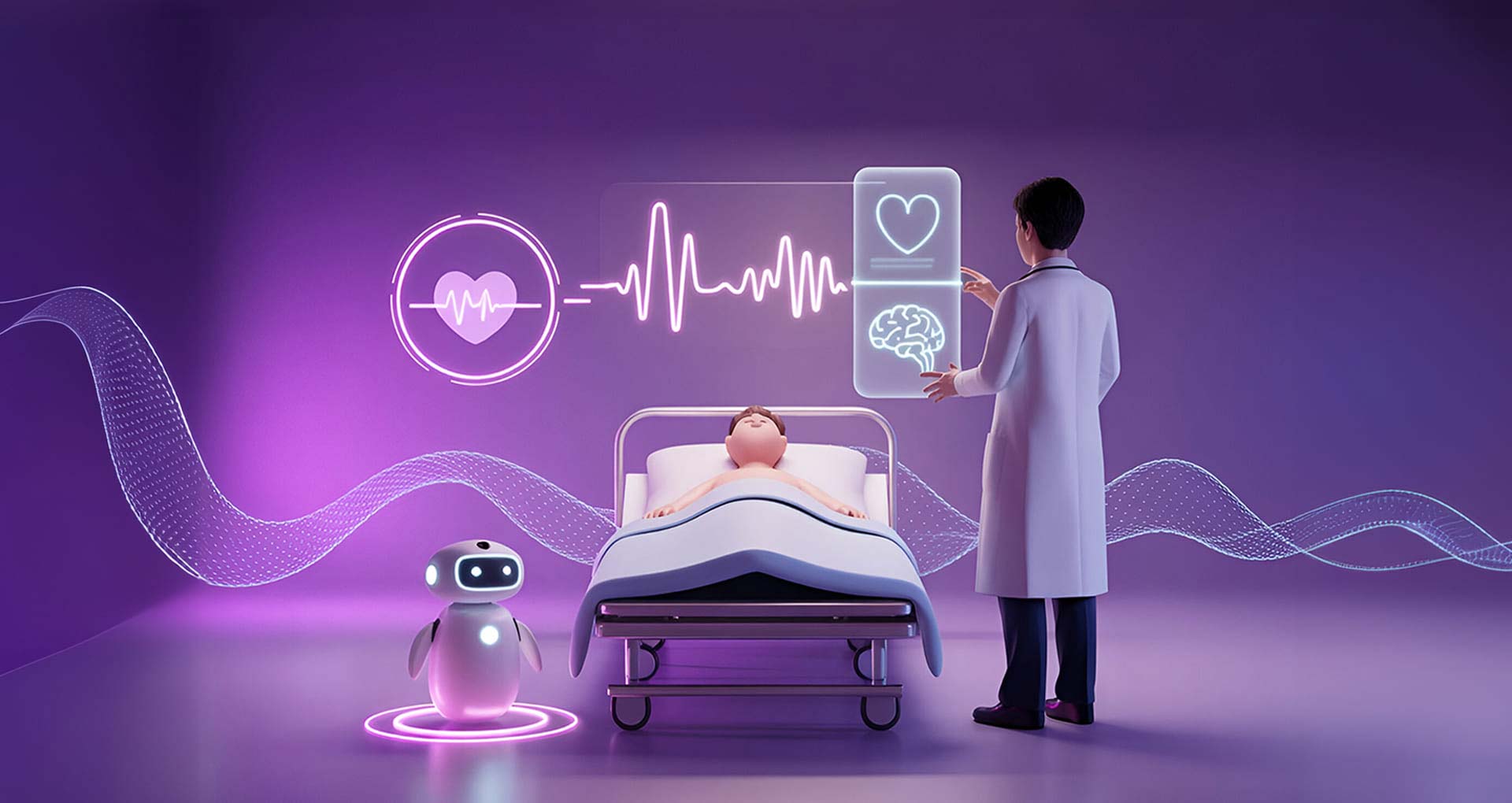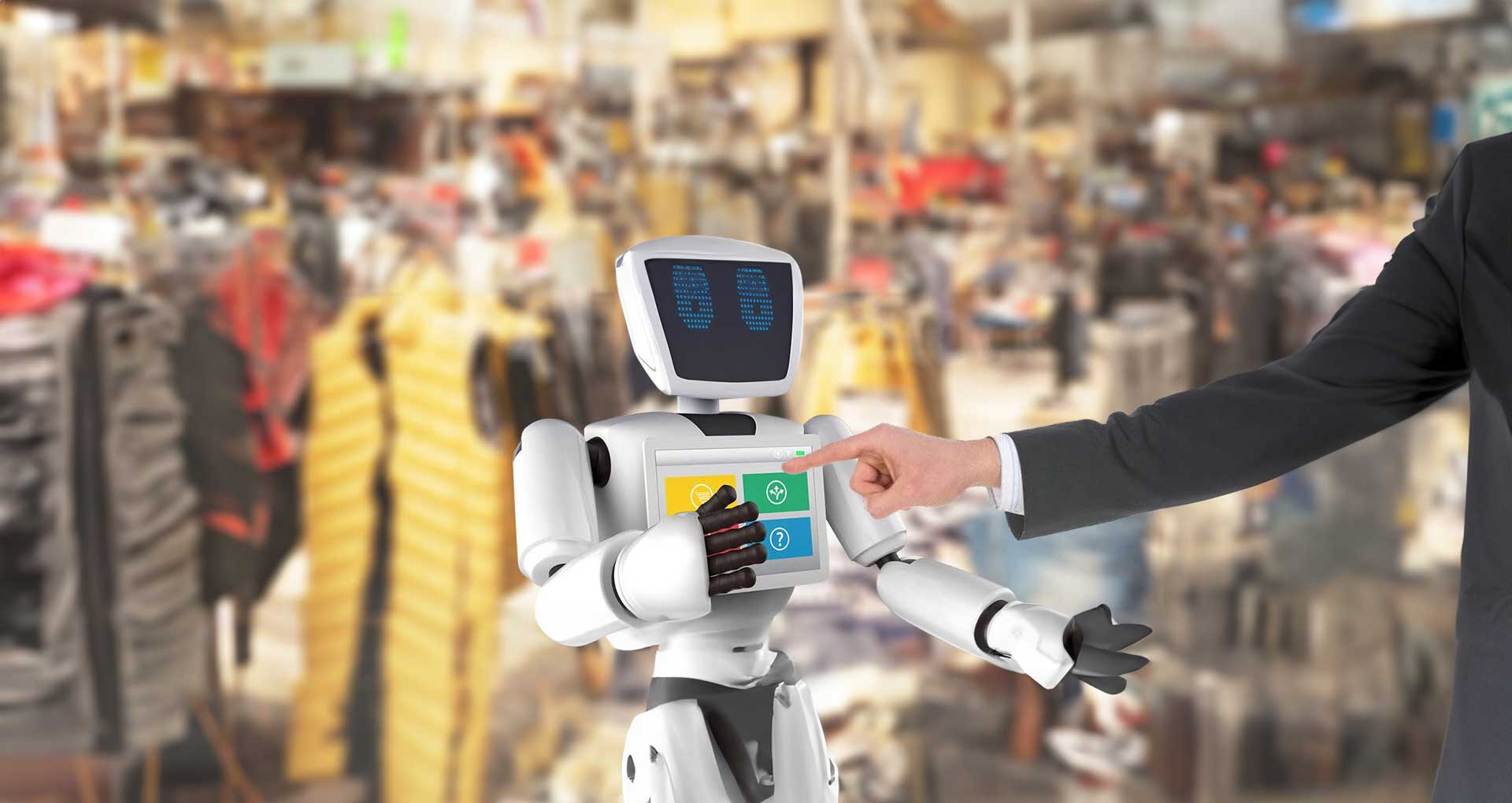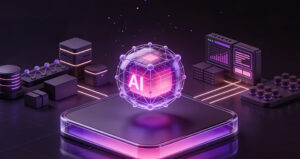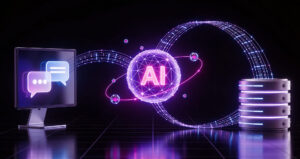From evolution to advancement, the healthcare landscape is rapidly embracing technology as a catalyst to transform various aspects, including patient care management, administrative functions, clinical processes, and more. Healthcare stakeholders today recognize the promising advancements in Generative AI and large language models as essential tools for survival, focusing on building, integrating, and deploying scalable healthcare systems.
The constant expansion of Generative AI in healthcare goes beyond basic training and the generation of original, contextually accurate content. As a subset of AI technology, GenAI enables data-driven approaches that create new opportunities for healthcare providers, patients, and stakeholders across the ecosystem. Gen AI streamlines clinical workflows, reduces administrative burdens, enhances diagnostic accuracy, and enables personalized care to modernize healthcare through innovation in numerous ways. According to the reports, the Generative AI in Healthcare Market is projected to grow at a CAGR of 33.2%, reaching $20.2 billion by 2032.
Looking to enhance healthcare operations and add efficiency with Generative AI? This blog is the perfect guide for you. We cover the critical intersection of Generative AI and healthcare, highlighting use cases, key benefits, common challenges, and solutions to overcome them. Let’s explore!
Applications of Generative AI in Healthcare Industry
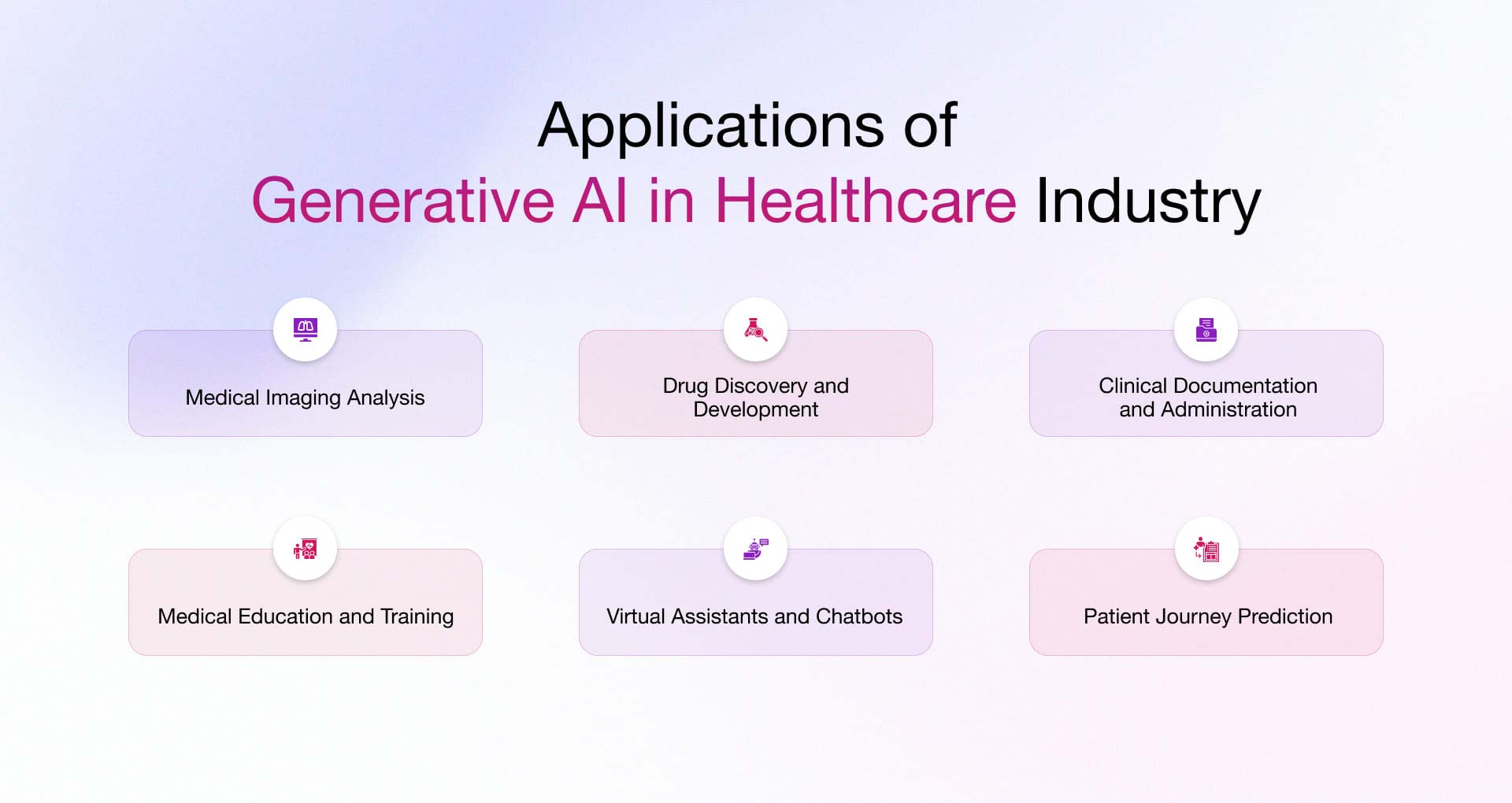
GenAI leverages deep-learning algorithms to offer new possibilities to streamline overall clinical workflows, increase efficiencies, and improve patient care and operations. From administrative and operational use cases to clinical trials, research, and development to patient engagements, healthcare organizations are today using GenAI to tackle the healthcare industry’s challenges. Let’s explore some major Generative AI use cases in healthcare.
Medical Imaging Analysis
Gen AI models are generally trained on large, structured datasets to generate and compose new data. Similarly, healthcare providers utilize deep learning frameworks and advanced Generative AI models that feature convolutional neural networks (CNNs) and are trained on various medical imaging datasets to improve the overall diagnostic process. While CNNs overtime excel at extracting critical features from medical images, Generative AI techniques like GANs, VAEs, and flow-based models enhance analysis and image generation capabilities. Traditionally, obtaining medical image data has been challenging due to their specialized nature and privacy concerns, as well as complex DICOM formats that differ from standard RGB images. Analyzing these images with methods such as image-to-image translation, data augmentation, and radiology report generation can lead to better diagnoses and quicker treatment, with medical images serving as key players in modern healthcare services.
Generative AI can also generate synthetic medical images with specific conditions or variations, which is useful for dataset augmentation and training to support radiologists in diagnostic decision-making.
Drug Discovery and Development
Generative AI is transforming pharmaceutical research by accelerating the traditionally lengthy and costly drug development process. Gen AI in healthcare helps pharmaceutical researchers streamline multiple phases of drug discovery, efforts from identifying chemical compounds to practical applications like molecule and compound generation, biomarker identification, drug-target interaction prediction, drug repurposing and combination, and drug side effects prediction. Generative AI assists with drug development by calculating the molecular structures of various ingredients and their chemical behaviors. This allows neural networks to combine pharmaceutical ingredients in specific ways to improve their effectiveness.
Through Gen AI-enabled data-driven and automated approach, algorithms can generate drug molecules, design trial protocols, and predict outcomes during clinical trials, which accelerates the drug discovery and development process and brings efficiency and accuracy while also minimizing costs. Generative AI algorithms, specifically deep learning models trained on structural databases, can analyze and predict molecular conformations and properties. These models leverage techniques like reinforcement learning and transformer architectures to generate molecules with desired properties while maintaining chemical feasibility. By integrating biomarker data and molecular pathways, these systems support the development of targeted therapeutics for personalized medicine. Thus, it’s no surprise that the Generative AI drug discovery market size is expected to reach a whopping $ 1129 million by 2032 at a CAGR of 27.1% from 2023 to 2032.
Clinical Documentation and Administration
Generative AI significantly reduces the administration burden on physicians and healthcare providers and reduces burnout so they can focus more on quality patient care. Traditional administrative tasks, from handling medical documentation to scheduling appointments, consume substantial resources and contribute to physician burnout. LLMs, such as ChatGPT, can automate clinical documentation and note-taking, billing and claims processing, real-time transcription, and intelligent summarization of medical records, providing crucial points to summarize documents. It helps convert hours of tasks into seconds, saving significant effort while maintaining accuracy. Healthcare providers can create custom AI-powered chatbots to serve as a preferred assistant for patients with queries about booking and rescheduling appointments. The adoption of Generative AI in healthcare thus makes it easier for the administrative department, including prioritizing tasks, effective communication management, swift insurance processing, workflow optimization, and supply and medical inventory management.
Medical Education and Training
Generative AI is reshaping education in healthcare by bridging the gap between theoretical knowledge and practical application. Integration with VR helps generate realistic patient simulations that allow medical students to practice clinical skills. These simulations unlock new learning experiences for students by covering a wide range of scenarios, enabling students to engage in case-based learning and clinical reasoning exercises.
Medical trainees can practice surgical procedures in a virtual operating room and receive real-time feedback on their techniques using GenAI-powered VR experiences. It can also help generate synthetic medical imaging data, including X-rays, CT scans, and MRIs with varying degrees of pathology, providing a valuable tool for diagnostic training.
Virtual Assistants and Chatbots
Many healthcare services providers, including clinics still juggle long hold times, slow follow-ups, and paperwork overload. Virtual assistants powered by generative AI fix tone of problems healthcare is overburden with, due to its high-level use cases. They answer symptom questions, book appointments, and guide patients through claims. All in plain language. All day, every day.
The tools plug into your current systems. Admin team can stay focused on care instead of screens and other complex & manual process. Wait times drop. Patients trust the process because answers come fast and feel human.
Each new chat sharpens the assistant’s skills, so efficiency keeps climbing on its own. Ready to see the numbers for your organization? Start a pilot with our AI agent development services and watch the savings add up.
Patient Journey Prediction
Generative AI enhances patient journey prediction by closely analyzing large volumes of medical and behavioral data to anticipate next steps in care and procedure. If you are thinking it is as traditional one, it goes beyond traditional reporting by generating natural language insights that flag potential risks, such as missed appointments or readmissions and suggest timely interventions. These models operate within a multiagent system, integrating inputs from triage, scheduling, and claims to create a unified patient view.
The impact is both clinical and operational. Automating journey prediction reduces manual workload, improves care coordination, and supports faster decision-making. As the system learns from ongoing interactions, prediction accuracy improves, helping healthcare providers scale personalized care while maintaining efficiency.
Real-World Examples of Gen AI Implementation in Healthcare
There are multiple examples nowadays where Generative AI is creating a visible and noticeable impact in healthcare. Below, we’ve listed a few examples of organizations and research institutions already demonstrating its potential. But before diving into the detailed use cases, let’s take a quick look at a few notable examples.
The University of Michigan developed a Generative AI model to simulate various scenarios for sepsis treatment. Google’s Med-PaLM 2 AI, trained on the MedQA dataset, achieved 85% accuracy in medical question-answering but still requires further refinement. Navina, a medical AI startup, built a Generative AI assistant that manages administrative tasks by accessing EHRs, insurance claims, and documents, recommending care, and generating structured documents like referral letters.
Here are some of the more detailed and widely recognized real-world examples of how organizations are adopting Generative AI at scale and with increasing speed.
Mayo Clinic – Clinical Documentation with Microsoft Copilot
Mayo Clinic has implemented Microsoft 365 Copilot, an LLM-powered assistant, to automate form-filling and administrative tasks within its clinical workflows. This adoption helps clinicians reclaim time from documentation to focus on patient care.
Cleveland Clinic – Patient Engagement & Admin Support
Cleveland Clinic is piloting GPT-powered tools to streamline patient messaging, appointment booking, refill reminders, and documentation tasks—aiming to reduce clinician inbox overload and improve efficiency in provider workflows, modern Healthcare.
Mount Sinai (Icahn School of Medicine) – Secure ChatGPT for Education & Research
While deployed in a learning context, Mount Sinai’s rollout of ChatGPT Edu demonstrates secure, HIPAA-compliant generative AI use within its health system—highlighting institutional readiness to scale GenAI into clinical and operational domains Mount Sinai Health System.
Pfizer – GenAI for Drug Discovery with AWS & Partners
Pfizer’s PACT initiative with AWS uses generative AI prototypes to accelerate drug discovery—saving up to 16,000 scientist-hours per year and cutting infrastructure costs by 55% Amazon Web Services.
Additionally, Pfizer’s ongoing collaborations include:
- XtalPi (expanded June 2025) to build advanced generative models for small molecule design.
- PostEra (expanded January 2025) using its Proton platform for antibody-drug conjugate design, PR Newswire.
- CeMM collaboration (April 2024) deploying AI to map molecule-protein interactions and accelerate early discovery, Business Wire.
Benefits of Generative AI in Healthcare Industry
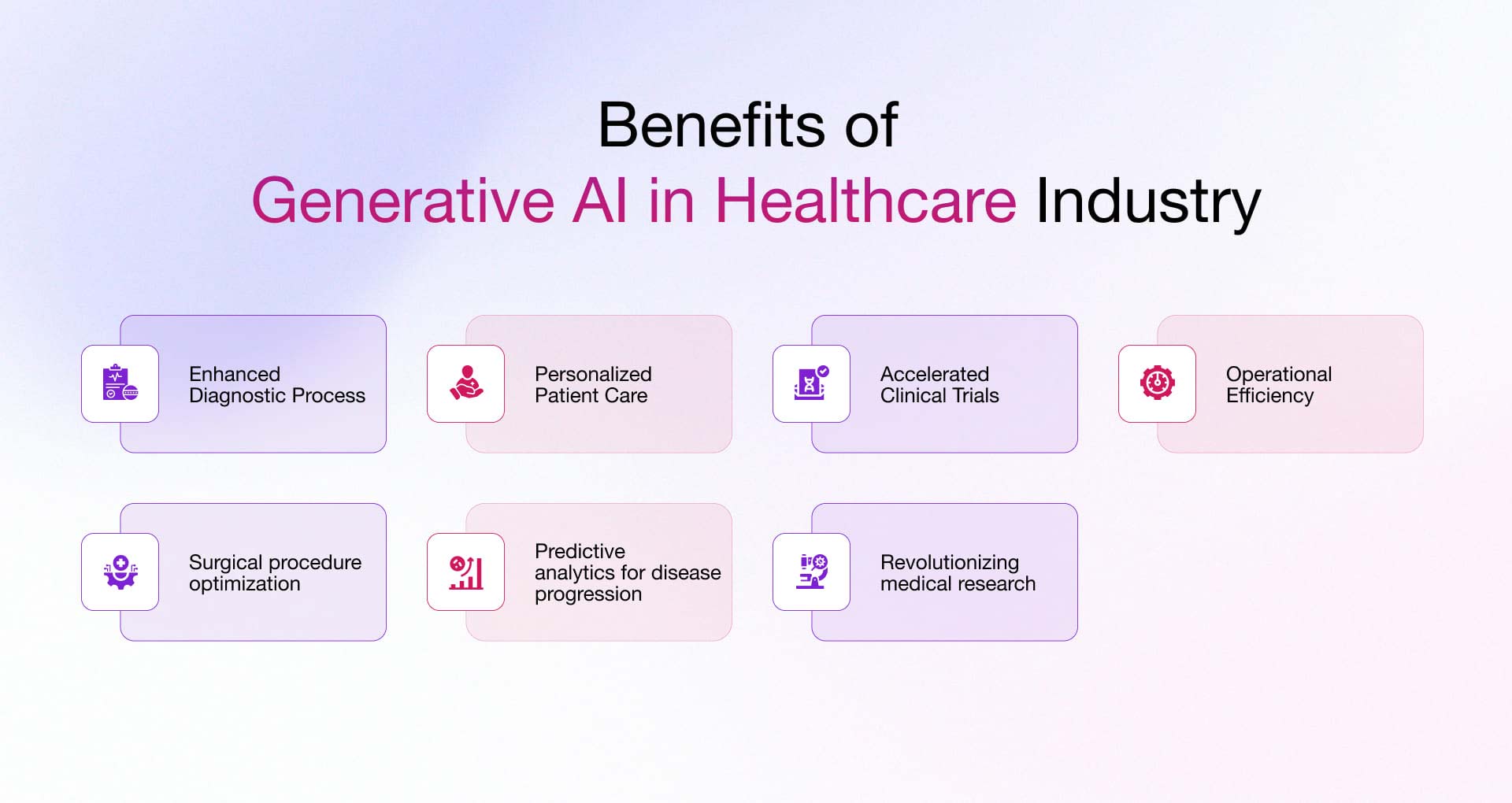
Generative AI for healthcare offers significant potential, offering automated clinical systems, drug discovery, improving decision-making processes, enhancing diagnostic accuracy, and promoting treatment personalization for quality patient care. Its ability to learn from complex datasets and produce data-driven insights helps unlock new capabilities and enhanced efficiencies in healthcare operations that were previously not possible. Here are the key benefits of Generative AI in healthcare.
Enhanced Diagnostic Process
Generative AI is transforming diagnosis and treatment planning through advanced data analysis and pattern recognition. It enhances the diagnostic process in multiple ways. It generates synthetic medical imaging data, including X-rays, CT scans, and MRIs with varied pathological examples for training datasets and improving disease detection accuracy. AI-powered Clinical Decision Support Systems (CDSS) can analyze complex patient data and generate real-time insights to create more informed treatment planning and improved risk management. Generative AI’s ability to create synthetic examples of rare conditions and assist in drug development is further helping evolve healthcare delivery and improve patient outcomes.
Personalized Patient Care
Generative AI is advancing personalized patient care by analyzing comprehensive patient data to create tailored medical solutions throughout the healthcare journey. It processes multiple data points – including medical histories, genetic profiles, lifestyle factors, and treatment responses – to predict health risks. Integrating Generative AI systems enables healthcare providers to analyze individual patient data to create personalized treatment plans, monitor treatment effectiveness, trigger timely interventions, and enable proactive health monitoring for continuous care management.
Additionally, Generative AI enhances patient engagement by summarizing medical reports in patient-friendly language to make them more accessible and understandable. It also makes the diagnostic process more accurate and empowers patients to be more vigilant in their own healthcare by allowing self-scheduling appointments through Gen AI-powered chatbots or intelligent scheduling systems.
Accelerated Clinical Trials
By acting as a catalyst behind multiple stages of clinical trials, Generative AI can make the entire process faster and more seamless. Virtual patient simulations with diverse synthetic patient data profiles allow researchers and healthcare professionals to predict trial outcomes more accurately than ever.
Advanced Generative AI models, like Generative Adversarial Networks (GANs) and Variational Autoencoders (VAEs), play key roles in this process. These models help refine the most suitable protocols before patient engagement, reducing uncertainties. Additionally, they enhance patient recruitment by enabling decisions based on a deep analysis of patient history records and genetic details.
Operational Efficiency
Generative AI’s versatility in healthcare brings operational excellence in numerous ways. Automating manual processes, such as scheduling, billing, and insurance in administrative tasks, frees up resources to focus on more critical areas, such as patient care and reduces the likelihood of errors.
Forecasting requirements for medical equipment enables proactive inventory management during peak periods. Additionally, document summarization in seconds saves time and effort while achieving a high degree of accuracy.
While Generative AI offers transformative benefits for healthcare delivery, healthcare organizations must navigate several key challenges to successfully implement these technologies.
GenAI Solutions to Tackle the Biggest Challenges in Surgery
Generative AI is a transformative healthcare-technology solution to tackle the biggest challenges in surgical planning. By simulating outcomes based on patient-specific anatomy and conditions, it helps define the most effective approach. This results in better, more affordable, and more accessible care. Combined with robotics and real-time feedback, it boosts surgical effectiveness, ensures high-quality care, and supports a modern operating model for clinical decision-making.
Predictive Analytics in Underinvested Areas of Health
GenAI is now a key driver of new sources of value in underinvested areas of health like chronic disease management. By analyzing longitudinal data genetics, lifestyle, biomarkers it predicts how diseases evolve over time. This combines qualitative analysis with proven operational approaches, enabling early interventions with lasting impact. In the face of high inflation rates, these generative AI applications are raising questions about how underlying micro factors—like social behavior or environmental risks, affect long-term health outcomes and care delivery models.
Advancing Research and Expanding Data Possibilities
Generative AI is advancing research by uncovering complex patterns and creating and promoting data models that simulate biological functions. Through synthetic datasets, it drives innovation where real-world data is limited without breaching privacy. These advancements are more than trending; they carry deep implications for global healthcare systems. As leaders think beyond their core capabilities, GenAI helps deliver insights that transform healthcare systems and organizations around the world revealing recipes for success in a rapidly evolving medical landscape.
While Generative AI in healthcare industry offering transformative benefits, healthcare organizations must navigate several key challenges to successfully implement these technologies.
Common Challenges for Adopting Gen AI in Healthcare and Their Solutions
Despite the significant benefits, healthcare organizations face several challenges when adopting the capabilities of Generative artificial intelligence. Here is a quick list of challenges and their most optimal solutions.
Ethical Consideration: One of the raising concerns regarding implementation of Gen AI is its ethical implications. Healthcare organizations must carefully balance AI recommendations with human medical expertise and clinical judgment.
- Solution: Healthcare providers can consider aspects like transparency and accountability while building Gen AI models.
Data Security and Privacy: Making a Generative AI-powered system work according to your healthcare process demands a wide range of sensitive data, such as patient details. Thus, the concern for data security and proper usage undoubtedly knocks on the door.
- Solution: Healthcare service providers can implement HIPAA-compliant security protocols and deploy advanced data encryption approaches. Ensuring strict data access controls and data governance policies.
Potential Biases: Generative AI models that are trained on previously collected data on a particular element definitely inherit biases. This can lead healthcare providers to struggle with inequitable healthcare outcomes.
- Solution: To avoid biases, it is crucial to keep the Generative AI model trained with a diverse range of data and updated regularly/after the particular time period to ensure fairness across the decision-making process.
Integration with Existing System: Integrating the Generative AI model into the existing workflow can be a daunting task either due to the outdated system or lack of interoperability. It presents technical and operational difficulties.
- Solution: Investing in upgrading IT infrastructure and a comprehensive integration strategy is the most suitable way to solve this challenge. It is best to approach in a phased deployment plan to minimize operational disruption.
How Rishabh Software Helps Build Generative AI Solutions for Healthcare
We are a leading software development firm offering comprehensive AI software development services and Gen AI development services to build and integrate Generative AI-based solutions that address the biggest challenges and complexities of the healthcare industry.
Our years of experience in healthcare development services enable us to build Generative AI solutions that empower healthcare providers to streamline clinical processes, enhance patient care, drive operational efficiency, and address specific challenges. We can help you develop custom Generative AI healthcare solutions that focus on generating medical insights, streamlining workflows, and supporting data-driven decision-making.
We are a trusted partner in your journey of intelligent healthcare transformation, with expertise in data science, business intelligence, data analytics, and healthcare AI to drive intelligent transformation in patient care delivery.
Frequently Asked Questions
Q: What is Generative AI in healthcare?
A: Gen AI in healthcare is the process of utilizing advanced algorithms in the form of AI-powered solutions to help healthcare providers generate new medical insights, simulate patient data, and optimize clinical processes, improving diagnoses and speeding up the treatment process.
Q: What is the future of Generative AI in healthcare industry?
A: The future of Gen AI in healthcare promises refined algorithms for more precise diagnoses, broader applications like predictive modeling and drug discovery, and enhanced integration with technologies like medical imaging. Increased collaboration between healthcare providers, researchers, and tech companies will further drive AI advancements in patient care.
Q: How does Generative AI work for healthcare organizations?
A: Generative AI analyzes vast datasets, generates synthetic medical data, predicts disease patterns, and automates tasks, helping healthcare organizations streamline operations and enhance patient care.
Q: What are the latest Generative AI trends in healthcare in 2025?
A: In 2025 generative AI has a big impact on healthcare with new trends like:
- AI tools that turn speech into text for medical records in real time helping doctors avoid burnout.
- Creating fake data to train diagnostic systems without risking patient privacy.
- Custom treatment plans that use many types of data (health records, scans genetic info).
- Speeding up drug discovery by making new molecules and figuring out protein shapes.
- Making medical images clearer and spotting odd things, which helps doctors diagnose faster and better.
Q: What are the latest Generative AI trends in healthcare in 2025?
A: Generative AI gives healthcare startups a boost by cutting down on time and money spent on development. It allows them to:
- Test new diagnostic tools using made-up data.
- create content to teach patients, market products, or write chatbot scripts.
- Make work easier with tools that handle coding, paperwork, and reports.
- Scalable virtual assistant integration to handle patient queries, schedule appointments, and perform remote triage.
Q: How does Generative AI support virtual healthcare?
A: Generative AI has an impact on virtual healthcare by improving:
- Real-time patient interaction with smart AI-powered chatbots and voice assistants.
- Clinical support through AI-summarized notes from video consultations.
- Remote diagnostics by better medical image interpretation and symptom checking.
- Customized wellness plans created from patient data, to promote preventive care.
